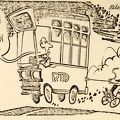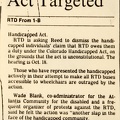Denver Post 1/82
PHOTO (no credit given): A man in a wheelchair (Stephen Saunders) is tipped back in a wheelie by one man, as another bends forward over his legs and reaches down on the side of his wheelchair. Behind them a couple of police officers are visible.
Caption reads: Stephen Saunders is carried away from the offices of the Regional Transportation District during a January protest over an RTD decision to not make some new buses accessible to the handicapped.
[Headline] RTD Fighting Handicapped Act
By Howard Pankratz
Denver Post Staff Writer
The Regional Transportation District, long at odds with various segments of Denver’s handicapped community is asking Denver District Judge Harold Reed to declare the Colorado Handicapped Act unconstitutional.
At the time the state Legislature passed the act, it said it was doing so to “encourage and enable the blind, the visually handicapped, the deaf, the partially deaf, and the otherwise physically disabled to participate fully in the social and economic life of the state and to engage in remunerative employment.”
But RTD in motions filed in recent weeks with Reed, has charged that the statue is unconstitutionally vague and overbroad. RTD also says that those who violate the act are subject to a criminal penalty.
In particular, RTD lawyers Alan E. Richman and Lawrence D. Stone take aim at a section the act which says the handicapped are “entitled to full and equal housing and full and equal accommodations, advantages, facilities, and privileges of all common carriers, airplanes, motor vehicles, railroad trains, motor buses, streetcars, boats or any other public conveyances or modes of transportation…”
Does that mean, ask the RTD lawyers, that “cab drivers are liable for criminal penalty for refusing to buy cabs which can transport persons in wheelchairs? What about persons in iron lungs or on other life support systems? Does this mean that a private automobile has to be wheelchair accessible?”
The act, they contend, is sweeping in nature and poses an “impossible conundrum… to an organization or a person who wishes not to violate its provisions on pain of criminal sanctions.”
Those who violate the act are guilty of a misdemeanor and are subject to a maximum sentence of a $100 fine and 60 days in county jail.
In January 1982, seven wheelchair-bound individuals and the Atlantis Community for the disabled accused the district in a lawsuit filed in Denver District Court of violating both the Colorado Handicapped Act and a settlement reached in federal court several years ago.
Basically they contended that in the federal settlement RTD agreed that all new buses would have wheelchair-lift equipment.
Although many of the new buses are accessible to people in wheelchairs, they contend that RTD has decided against making 89 new buses, due for delivery in June, accessible to the handicapped.
By denying such access, says the lawsuit, RTD has breached both the terms of the federal settlement and the duties it owes the handicapped under the Colorado
- Created on
- Wednesday 10 July 2013
- Posted on
- Tuesday 10 May 2016
- Tags
- Atlantis Community, Colorado Handicapped Act, disabled people, lawsuit, lifts on all NEW buses, RTD, settlement, unconstitutional, wheelchair bound
- Albums
- Visits
- 2523
- Rating score
- no rate
- Rate this photo


0 comments